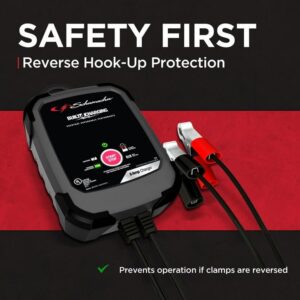Is it my battery, starter, or alternator? If you’ve found yourself pondering this question while facing car troubles, worry not! We’ve got you covered. In this article, we will delve into the common issues that arise with these vital components of your vehicle’s electrical system. By understanding the symptoms and signs associated with each, you’ll gain valuable insights that will help you diagnose and address the problem efficiently. So, let’s dive right in and unravel the mystery behind “Is it my battery starter or alternator?” Keep reading to become a master of automotive problem-solving.
Is it My Battery, Starter, or Alternator?
Introduction
Dealing with car troubles can be incredibly frustrating, especially when you’re not sure what’s causing the issue. If your vehicle won’t start, the problem could lie with three crucial components: the battery, starter, or alternator. Determining which of these components is causing the problem can save you time, money, and unnecessary repairs. In this article, we’ll delve into each component, explain how they work, and provide you with the necessary information to identify the culprit. So, let’s dive in and understand the battery, starter, and alternator in detail.
The Battery: Powering Your Vehicle
The battery is one of the most critical components of your vehicle’s electrical system. It provides the initial power necessary to start your car. The battery stores electrical energy and supplies it to various components, such as the starter motor and ignition system, to initiate the engine’s combustion cycle.
Here’s how the battery works:
- The battery’s chemical reactions create a flow of electrons, generating electrical energy.
- This electrical energy is then delivered to the starter motor, which cranks the engine to start the combustion process.
- Once the engine is running, the alternator takes over and recharges the battery while also powering the vehicle’s electrical systems.
Signs of a Faulty Battery
A faulty battery can often be the reason your car won’t start. Look out for these common signs:
- The engine cranks slowly or not at all.
- You experience difficulty starting your vehicle, particularly in cold weather.
- Interior lights and other electrical components are dim or don’t function properly.
- Your battery warning light is illuminated on the dashboard.
How to Test Your Battery
To determine if your battery is the culprit, you can perform a simple test using a multimeter:
- Switch off all electrical components in your vehicle.
- Set your multimeter to the DC voltage range.
- Connect the red lead from the multimeter to the positive terminal of the battery, followed by the black lead to the negative terminal.
- Read the voltage displayed on the multimeter. A fully charged battery should read around 12.6 volts or higher.
- If the voltage is significantly lower, your battery may be discharged or faulty.
The Starter: Igniting the Engine
The starter is responsible for physically turning the engine’s crankshaft to initiate the combustion process. It requires a substantial amount of electrical energy to function correctly, which is supplied by the battery. Once the engine starts running, the starter disengages itself from the engine’s flywheel.
Here’s how the starter operates:
- When you turn the ignition key or press the start button, an electrical signal is sent to the starter solenoid.
- The starter solenoid then engages, allowing electrical current to flow through the starter motor.
- This electrical current causes the starter motor’s gear to engage with the engine’s flywheel.
- Once engaged, the starter motor spins the engine’s crankshaft, starting the combustion process.
- Once the engine is running, the starter disengages itself from the flywheel.
Signs of a Faulty Starter
A faulty starter can prevent your engine from starting or cause significant issues during the starting process. Look out for these signs:
- You hear a clicking sound when you turn the ignition key, but the engine doesn’t start.
- The engine cranks very slowly or not at all, even with a fully charged battery.
- There is a grinding noise when you attempt to start the engine.
- You notice smoke or a burning smell coming from the starter.
How to Test Your Starter
To test if your starter is functioning correctly, you can perform a simple bench test:
- Remove the starter motor from your vehicle.
- Connect the starter motor to a 12-volt power source using jumper cables.
- Ensure the starter is properly grounded.
- Activate the starter by momentarily connecting the positive battery terminal of the power source to the starter’s solenoid terminal.
- If the starter motor spins freely and forcefully, it is most likely functioning correctly.
- However, if you encounter any issues, it may be necessary to have your starter professionally tested or replaced.
The Alternator: Powering Your Vehicle’s Electrical Systems
The alternator is responsible for generating electrical energy while your engine is running. It not only powers your vehicle’s electrical systems but also recharges the battery to ensure it remains at full capacity. The alternator produces an alternating current (AC), which is then converted into direct current (DC) to supply power to your vehicle.
Here’s how the alternator works:
- When the engine runs, the alternator belt drives the alternator, causing it to spin.
- As the alternator spins, it produces AC voltage in the form of three-phase electricity.
- This AC voltage passes through a rectifier, converting it into DC voltage.
- The DC voltage is then used to power your vehicle’s electrical systems and recharge the battery.
Signs of a Faulty Alternator
A faulty alternator can lead to numerous electrical issues in your vehicle. Keep an eye out for these common signs:
- Your battery is frequently discharged or dead, even after being recently replaced.
- You experience dim or flickering headlights.
- Your dashboard warning lights, such as the battery or check engine light, are illuminated.
- Your vehicle’s electrical systems, such as power windows or the radio, intermittently fail or operate erratically.
How to Test Your Alternator
To test if your alternator is functioning correctly, you can perform a simple voltage test with a multimeter:
- Start your engine and let it idle.
- Set your multimeter to the DC voltage range.
- Connect the red lead from the multimeter to the positive terminal of the battery and the black lead to the negative terminal.
- Read the voltage displayed on the multimeter. A functioning alternator should produce around 13.5 to 14.5 volts.
- If the voltage is significantly lower or higher, your alternator may be faulty.
Determining whether the problem lies with your battery, starter, or alternator is crucial in resolving any starting issues with your vehicle. By understanding how each component works and recognizing the signs of failure, you can diagnose the problem more accurately and avoid unnecessary repairs. Remember to perform the necessary tests to identify the faulty component and consult a professional if needed. Keeping your electrical system in check will ensure your vehicle starts reliably and performs optimally.
Frequently Asked Questions
1. How can I determine whether the issue lies with my battery, starter, or alternator?
To determine the source of the problem, start by checking the battery. If your car’s engine does not start at all or struggles to start, it might be a battery issue. Jump-starting the car can help determine if the problem persists. If jump-starting works, your battery may need to be replaced. However, if the engine still does not start, the issue may lie with the starter or alternator.
2. What are the signs of a faulty battery?
When your battery is faulty, you may experience symptoms such as your car not starting at all, dim headlights, or a clicking sound when turning the key. If you notice these signs, it is likely that the battery needs attention.
3. How can I determine if the starter is causing the problem?
If your battery is in good condition but the engine still does not start, a faulty starter might be to blame. Listen for a clicking sound coming from the starter area when you turn the key. If you hear clicks but the engine does not engage, it is likely that the starter needs to be replaced or repaired.
4. What are the common signs of a failing alternator?
A failing alternator can manifest in various ways. Some common signs include dimming or flickering headlights, an illuminated battery warning light on the dashboard, a dead battery even after a recharge, odd smells coming from the engine, or squealing noises. Pay attention to these indicators as they may suggest a problem with your alternator.
5. Can a bad alternator or starter drain the battery?
Yes, both a faulty alternator and a starter can drain the battery. If either of these components is not working properly, they can put excessive strain on the battery, causing it to drain quickly. It is important to address any issues with the alternator or starter promptly to prevent further battery drain.
6. How can I determine if my alternator is causing the battery to drain?
To check if the alternator is draining the battery, you can perform a simple test. Start the engine and disconnect the negative terminal of the battery. If the engine stalls or the lights dim significantly, the alternator may be the culprit. However, keep in mind that this test requires caution and should be performed by someone with technical knowledge or a professional mechanic.
Final Thoughts
Determining whether the issue lies with your battery, starter, or alternator can be quite a challenge. However, there are a few key indicators that can guide you in the right direction. If your engine fails to start and you hear a clicking noise, it’s likely a problem with the battery or starter. On the other hand, if your headlights are dim and your battery constantly needs charging, it points to an alternator issue. To diagnose the problem accurately, it’s best to consult a professional mechanic who can provide a definitive answer and recommend the necessary repairs. Don’t hesitate to seek expert assistance when it comes to resolving the question of “is it my battery starter or alternator.”



